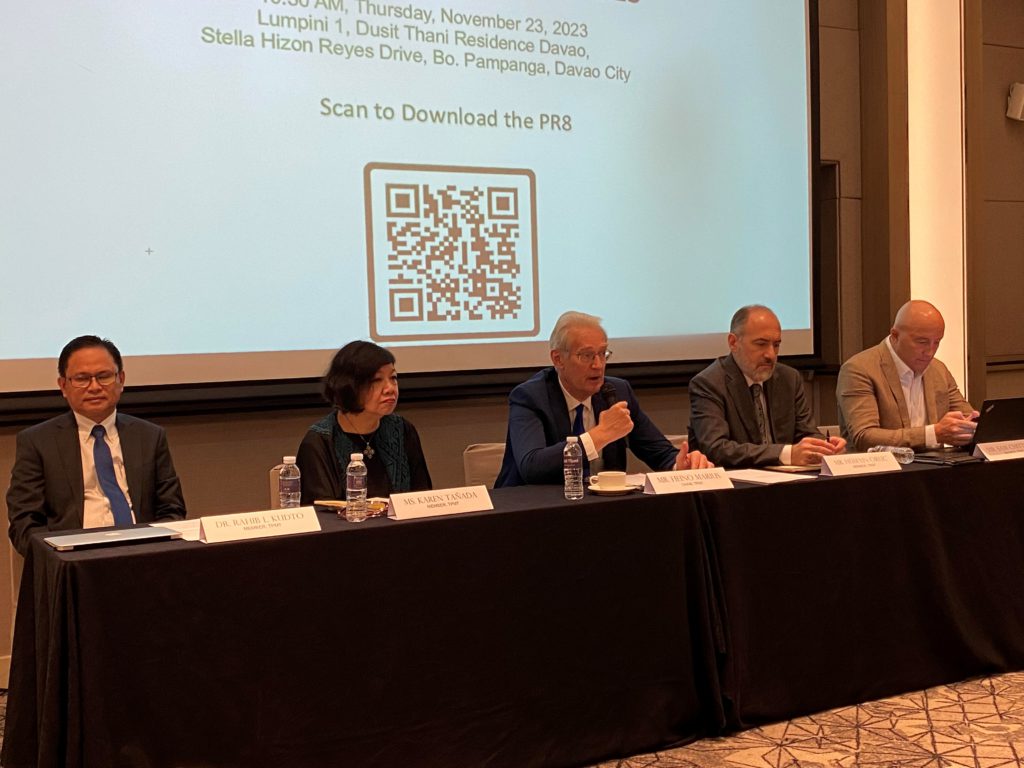
‘Solid progress on the political track but performance on normalization needs to accelerate’ – Third Party Monitoring Team

DAVAO CITY (November 23, 2023) – The Third Party Monitoring Team (TPMT) issued its Eighth Public Report today, November 23 on a Press Conference held here at Dusit Thani Residence and welcomes solid progress on the political track of the peace process highlighted the adopted electoral code and the local governance code of the interim Bangsamoro parliament. The Report covers the period from February 2022 to October 2023 including developments following the May 2022 elections.
The TPMT says that all inter-governmental relations mechanisms are now operational which is essential for effective coordination between the two governments in Manila and Cotabato. In a major win for the peace process, all factions of the Moro National Liberation Front (MNLF) are now represented in the Bangsamoro Parliament. These steps further consolidate the foundations for meaningful self-governance in the BARMM which in itself is an important achievement.
The reporting period also witnessed progress on the normalization track, however TPMT underscored that performance here needs to accelerate. According to the Independent Decommissioning Body (IDB) the 3rd phase of decommissioning of MILF combatants was almost completed in August this year but the provision of socio-economic support to decommissioned combatants and their communities has been slow in coming.
The TPMT said that recruitment of the Moro Islamic Liberation Front (MILF) and Moro National Liberation Front (MNLF) into the PNP finally started in 2023 but questions remain on how many recruits can ultimately be accommodated.
The report marked that National Amnesty Commission is now in place but the Presidential Proclamations which form the basis for filing amnesty applications have expired and need to be extended. Action on other topics featured in the Comprehensive Agreement on the Bangsamoro (CAB) including camps transformation, transitional justice, disbandment of private armed groups and redeployment of the AFP is still at an initial stage.
The TPMT Eighth Public Report from February 2022 to October 2023 proposes the following recommendations as way forward:
• Joint decisions are key to maintain the high degree of mutual trust which has been established between the Parties over the years. Unilateralism should be avoided.
• The Parties might wish to take stock of what has been achieved so far. A strategic review is recommended to define jointly agreed targets and an implementation roadmap until the end of the transition phase and if necessary beyond.
• The Bangsamoro Parliament should focus on adopting remaining priority codes, in particular the Bangsamoro Revenue Code and the Indigenous Peoples Code.
• Decommissioning is central to normalization. It is important to remove remaining uncertainties over the provision of socioeconomic support to decommissioned combatants and their communities.
• Target figures for recruitment into the PNP need to be clarified. The Parties might wish to discuss further how the policing concept outlined in the CAB could be better reconciled with policing provisions in the Bangsamoro Organic Law.
• Amnesty is crucial to facilitate the return of former combatants to civilian life. It needs to be fast-tracked. The renewal of the Presidential Proclamation on amnesty is urgently needed.
• Transitional Justice and Reconciliation is a task that needs to be pursued at national level. Bills under consideration in Congress to establish a National Transitional Justice and Reconciliation Commission for the Bangsamoro merit priority status.
• The Parties should work towards a solution for a continued role of the International Monitoring Team, even if modified from previous arrangements. An independent body to monitor adherence of the Parties to the ceasefire agreement is necessary to maintain a high level of confidence in the peace process.
“We as TPMT believe that the CAB remains the cornerstone for peace in the region. The peace process serves a higher purpose. The CAB aspires towards a new and unique form of autonomous political entity which reflects the distinct cultural identity of the Bangsamoro,” TPMT says.
The five members of TMPT chaired by Heino Marius, Karen Tañada of Gaston Z. Ortigas Peace Institute, Rahib Kudto of the UNYPAD, Huseyin Oruc of IHH, and Sam Chittick of the Asia Foundation, agreed that “many tasks still need to be accomplished and should now be tackled with determination as we approach the end of the transition phase and the first regional elections in the BARMM in 2025. As time is running short, full implementation of the peace agreements may no longer be possible by the end of the transition phase.”
“We note as positive that both Parties remain fully committed to the peace process, including at the highest levels. We are encouraged to observe that women play a very active role in the peace process,” TMPT said.
“Furthermore, in our discussions we have come across a perceptible new drive for more effective performance delivery and increased resources in support of normalization. These developments hold promise for the future of the peace process,” it added.
They said that most crucial for the successful conclusion of the peace process is the continued commitment and sincerity of both Parties to fully implement the peace agreements, for as long as this may take.

The mandate of the TPMT is to monitor, review and assess the implementation of all signed agreements between the between the Government of the Philippines (GPH) and the Moro Islamic Liberation Front (MILF), in particular the Comprehensive Agreement on the Bangsamoro (CAB) signed on 27 March 2014 and the Framework Agreement on the Bangsamoro (FAB) and its Annexes. (Tu Alid Alfonso, BMN/BangsamoroToday)

